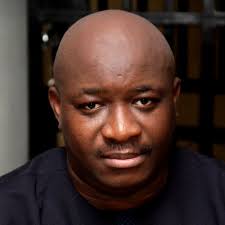
Mr. Edetaen Ojo, the Executive Director of Media Rights Agenda (MRA), has called on journalists to safeguard the environment by reporting on environmental issues and raising awareness about environmental challenges and solutions. He conveyed this message in Lagos on May 7, 2024, in his keynote address delivered at a symposium organized by the Human Rights Journalists Network Nigeria (HRJN) in partnership with the UNESCO Office in Nigeria, the Office of the High Commissioner for Human Rights, and the United Nations Information Centre (UNIC) in Nigeria to commemorate the 2024 World Press Freedom Day.
Mr. Ojo urged journalists to champion environmental causes through evidence-based reporting, exposing corruption, and combatting misinformation in advocating for a safe and sustainable environment.
He underscored the societal responsibilities of the media, citing constitutional protections and ethical codes that commit journalists to promoting human rights, democracy, justice, and equity. He cited Section 22 of Nigeria’s Constitution, which mandates the press, radio, television and other agencies of the mass media to, at all times, be free to uphold the fundamental objectives contained in chapter 2 of the constitution and uphold the responsibility and accountability of the government to the people as a basis for the media to monitor and ensure compliance with the state’s responsibility to protect and improve the environment.
He, however, raised pertinent questions about the media’s effectiveness in fulfilling this duty, questioning whether it sufficiently highlights the government’s constitutional obligation to safeguard the environment and hold authorities accountable for their actions or inaction.
Drawing on international declarations and frameworks, Mr. Ojo reiterated the media’s duty to promote human rights, including the right to a clean, healthy, and sustainable environment. He emphasized that the media can fulfill this duty through various means, including raising awareness about the importance of environmental conservation and advocating for relevant laws and policies.
He further outlined various approaches journalists can employ to ensure effective coverage of environmental issues, such as investigative reporting, science-based journalism, human-interest stories, policy analysis, and advocacy.
Mr. Ojo stressed that effective promotion of human rights for a clean environment hinges on a strong, independent, and professional media environment. He identified key challenges such as media censorship, lack of training, professionalism, and economic sustainability, which hinder the media’s ability to fulfill its role effectively.
He said: “There is no doubt that journalists will best be able to engage these issues and in particular promote the right to a sustainable environment within the context of a strong, independent and professional media environment.”
He noted that the topic of his keynote address implicitly recognizes this as it is not merely concerned with the media promoting human rights to clean, healthy and sustainable environment, but focuses on the role of “a free press” in this regard.
Mr. Ojo stated that where the media are weak and do not know what to do, they will be of little value in the task of ensuring the promotion of human rights.
He reiterated that media is weak where the media is not free and independent; media personnel are poorly trained or not trained at all; media personnel are unprofessional or unethical; media establishments lack basic infrastructure and facilities to operate; media establishments are not economically viable or sustainable; media establishments lack capital or access to capital; and circulation figures (for newspapers) or audiences (for radio and television) are low.
He stressed that: “Media with such characteristics have diminished capacity to foster development, and the notion of “media development” refers to an idea of seeking assistance to media to overcome such incapacities. The idea favours and seeks to build free, independent, professional, viable and sustainable media.”
Speaking on the state of media freedom and freedom of expression in Nigeria, Mr. Ojo lamented the frequent assaults and violations against journalists by government officials, security agencies, and non-state actors.
According to him, this pattern of impunity has consistently placed Nigeria among the worst countries in the world where crimes against journalists are not diligently investigated and perpetrators are never punished.
He said: “Journalists and media organizations continue to suffer various forms of attacks and violation of their rights in the hands of government officials, security and law-enforcement agencies as well as other non-state actors. Law enforcement agencies hardly bother to investigate such attacks and are not known to have arrested or prosecuted perpetrators.
“Invariably, the perpetrators of attacks on journalists and the media do so with impunity. In all documented incidents of attacks against journalists and the media, such perpetrators have gone free without being held accountable for their crimes against journalists.”
He condemned the weaponization of laws like the Official Secrets Act of 1962, the Criminal Code, the Penal Code, the Cybercrimes (Prohibition, Prevention, Etc) Act of 2015, and the Terrorism (Prevention) Act to harass and intimidate media practitioners and citizens exercising their right to freedom of expression.
To create an environment conducive for optimal media performance, Mr. Ojo called on Nigerian authorities to align the country’s laws and practices with internationally recognized norms and standards to safeguard media freedom and freedom of expression.




